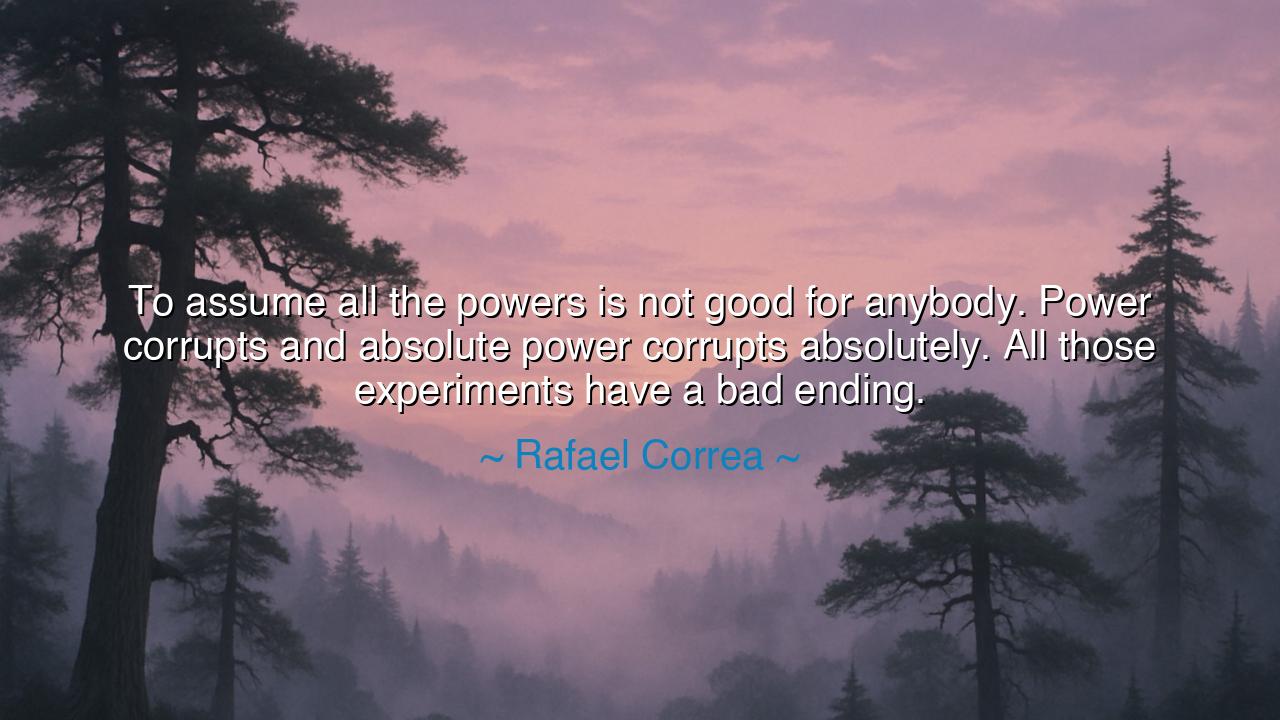
To assume all the powers is not good for anybody. Power corrupts
To assume all the powers is not good for anybody. Power corrupts and absolute power corrupts absolutely. All those experiments have a bad ending.






Hearken, O children of reflection, to the solemn admonition of Rafael Correa, who beheld the perils of unbridled authority. He declared that to assume all the powers is perilous for all, for power corrupts, and absolute power corrupts absolutely. In these words lies an eternal truth: the human spirit, when untempered by restraint, justice, or accountability, succumbs to hubris, and even the noblest intentions may give rise to tyranny. Here is a teaching for the ages: authority, like fire, can illuminate or consume, depending upon the wisdom of its steward.
The origin of this reflection stems from Correa’s experience as a leader and observer of governance in the modern world. Witnessing both the concentration of political power and the consequences of unchecked ambition, he discerned that experiments in absolute control often end in suffering, division, or moral decay. His words echo across time, reminding all who govern that responsibility and balance are inseparable from the wielding of authority.
The meaning of this aphorism is profound: no single mortal should claim dominion over all aspects of governance, for the temptation of absolute authority erodes virtue and justice. History demonstrates that concentrated power distorts judgment, blinds the mind, and inflames desire. Even leaders with vision and good intent may falter when accountability is absent, for human nature is vulnerable to excess, and corruption is the natural consequence of unchecked dominion.
History provides stark testimony to this warning. Recall the reign of Louis XIV of France, whose absolute monarchy, though magnificent in splendor, strained the kingdom’s resources and sowed seeds of unrest that would later erupt into revolution. Similarly, in the twentieth century, dictatorships across continents proved that when power is absolute, corruption and oppression become inevitable, leaving societies fractured and scarred. Correa’s words remind us that such experiments in concentrated authority rarely end well.
Yet this teaching is not solely a caution; it is a guide to righteous governance. The wise understand that shared power, checks and balances, and accountability safeguard virtue and protect the governed. Authority is most noble when it is exercised with humility, moderation, and awareness of the limits of the human heart. To resist the allure of absolute power is to honor justice, preserve society, and ensure that leadership serves rather than enslaves.
O generations yet to come, take heed of Correa’s counsel: power, unrestrained, is a peril to all. Let those who lead recognize the danger of absolute dominion, temper their ambition with wisdom, and design systems that prevent corruption. For only through balance, vigilance, and humility can authority fulfill its sacred purpose, and only thus may the experiments of governance find a just and enduring conclusion.






HQNguyen hoang quan
This quote raises questions about the moral dimensions of power. Does the corruption result from human weakness, systemic design, or both? I’m curious about the role of ethical leadership and personal integrity in resisting the allure of absolute power. Can individuals cultivate resilience against the corrupting influence of authority, or is structural limitation the only effective safeguard? How might these insights inform the design of modern governments and organizations?
TDTran Duong
I find myself reflecting on the universal warning embedded in this quote. Are there examples where leaders assumed broad powers but avoided corruption, or is absolute power inherently destructive? I’d like to explore whether the lessons from history are adequately considered in contemporary politics, and whether citizens are sufficiently vigilant against the centralization of authority. How can education and public awareness contribute to preventing the negative outcomes Correa mentions?
AVAnh Van
This statement prompts me to think about the balance between efficiency and checks on authority. How can societies reconcile the need for decisive leadership with the risk that concentrated power leads to corruption? I’m curious whether Correa views incremental reforms as sufficient to prevent abuse, or if systemic safeguards must be embedded into political structures from the outset. What mechanisms best prevent the ‘bad ending’ he warns about?
QKNhat Quang Khuc
Reading this, I wonder about the psychological effects of power on individuals. Is Correa emphasizing that corruption stems from the nature of power itself, or from the absence of external constraints? I’d like to examine how accountability, transparency, and civic engagement influence the likelihood of power being abused. Could empowering citizens and decentralizing authority act as effective remedies against the corrupting influence of absolute control?
N-Tran Bang Nhat Nhi -4D
I’m intrigued by the assertion that all experiments with absolute power have bad endings. Does this suggest that structural safeguards, like checks and balances or democratic oversight, are essential to prevent systemic collapse? I’d like to explore whether corruption is inevitable in human nature, or if cultural, ethical, and institutional factors can mitigate the risks associated with concentrated power. What lessons can current leaders draw from this perspective?